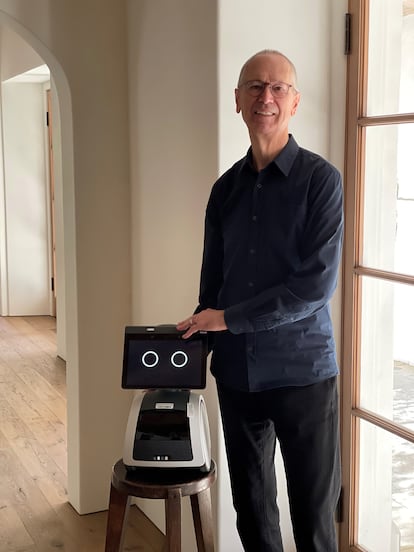What is Lab126, Amazon’s secretive research laboratory?
Little is known about this R&D facility in California that has come up with revolutionary products such as Kindle or Alexa, and the odd flop as well


Amazon is one of those few companies that can turn a whisper into a promise. “It is going to launch.” “It will arrive in Europe.” All the promises become headlines. And it all happens in Sunnyvale (California), where the company founded by Jeff Bezos has a secretive laboratory named Lab126. This is the place that has created Kindle readers, Fire tablets, the Alexa virtual assistant, the Echo smart speaker, the Amazon TV or the Astro home robot. But also where failures like the Fire Phone (2014) came from. That mistake cost $170 million dollars in cancellations, according to news reports of the time; a trifle for the juggernaut’s hardware-testing ground.
Discretion —or secrecy— is inseparable from the lab. Just look at the photograph that illustrates this story. Where was it taken? At the laboratory? In a private home? In neither of the two places? The only thing that is certain is the identity of the person smiling next to the Astro robot: Gregg Zehr, a hardware genius and president of Lab126. The conversation took place by videoconference, although much was left unsaid. “I can’t tell you how many people [several hundred] work at the lab.” “Nor when Astro will arrive in Europe or its price.” Nor of course could he discuss his upcoming projects. The interview revealed a very cordial individual who, like an enormously talented kid, enjoys the most difficult tasks at school.
Perhaps those days are not too far away. Gregg Zehr grew up on a farm, a place that the writer Truman Capote could well describe as “out there,” the words with which his non-fiction novel In Cold Blood starts. “We had cows, chickens; that was the environment,” he recalls. He soon excelled in math and followed in his older brother’s footsteps by enrolling in engineering at the University of Illinois. He started designing products for children. “I love them and also working with researchers who don’t know anything about engineering, and with engineers, like me, who don’t know anything about human behavior. The perfect team.”
Then, the intermittent journey of open and failed start-ups that the ambition of Silicon Valley entails. He was vice-president of hardware engineering at Palm Computing (where he led the team that developed handheld devices like Zire), vice-president of engineering at VA Linux, then joined Apple thanks to some colleagues from Motorola. He never met Steve Jobs. “It’s funny. He left just when I arrived, I saw him once in the parking lot, ”he recalls. He was there for nine years, seven in the area of desktop computers and two as vice-president of PowerBook engineering. In 2004 he joined Amazon. “I was interviewed by Jeff Bezos [founder of the company]. He is a great guy, it is true that he is complicated, but he was very involved in developing new products”, he reflects. “He is very demanding and always has new ideas.”
From that hyperactivity, in October, the laboratory emerged. The name comes from the Amazon logo, which draws a line that joins the "A" and the "Z". In the English alphabet, A is letter 1 and Z is letter 26. Lab126.
The first success came with the e-reader Kindle. It was launched (after three years of work) on November 19, 2007 and in five and a half hours all 90,000 available units were sold out. Bezos wanted to keep up the pace with CDs, videos, music, but Zehr convinced him not to. “It was the beginning of everything, a company that sold books. We had to start with this type of downloads,” he says. The first flop also arrived: the Fire phone. “We learned a lot. We knew that the market was saturated but we believed that there was room for the development of a new interface,” he defends. It was not so. Apple and Google had already cornered the market with a tide of apps of all kinds.
However, failing in the San Francisco Bay has a different meaning than in Europe. It just means starting somewhere else. Such as home robots. “Five years ago Bezos told us: we need to design those products,” says Zehr. So they created a kind of start-up within Amazon to produce them. “Jeff said, okay, and we did it. We needed engineers, sensor experts, camera designers... Lots of people. Because the robot had to answer two questions: where am I? Am I going to move safely?” Astro represents five years of work. “You can imagine how many times we failed, but it’s a lot of fun,” he concedes. In fact, they have a specific area where the products go through extreme shock, water, heat tests and any kind of random situations, even the most crazy ones, that come to mind. And it’s all with the backing of a colossus of artificial intelligence, machine learning and cloud computing, where its subsidiary AWS is a powerhouse. They’re like the Lego pieces of the future. “Crazy ideas are my favorites,” admits the president of the laboratory.
Perhaps there is no greater madness and uncertainty these days than in the future. At Lab126 they have their own technological premonitions. “I think there is still a lot of work to be done between the human being interacting with large amounts of information; we have to make it easier. And for that, artificial intelligence and Alexa are a good starting point”, says Zehr, who envisions a different tomorrow where people’s heads will not be continually bent over consulting “the stupid cellphone” as they walk around. There will be an assistant in each house, perhaps hanging on the wall or moving on the floor, and through it financial transactions will be carried out, we will control the lights in the house, select the music to be played or carry things from one place to another, he posits. Humanistic technology? Or an iridescent oxymoron? One of the richest men in the world is building prodigious hardware (in competition with Samsung, Apple, Google or LG), but what is his social involvement? Should Bezos pay a 90% tax rate, as the French economist Thomas Piketty argues? “I’m afraid I don’t have a good answer to your question,” notes Zehr. “I’m a successful farm-raised inventor and engineer, and I’m very involved with young people. However, as a species, we have to ask ourselves what world we want to live in.” That, perhaps, is the biggest secret of all.
Tu suscripción se está usando en otro dispositivo
¿Quieres añadir otro usuario a tu suscripción?
Si continúas leyendo en este dispositivo, no se podrá leer en el otro.
FlechaTu suscripción se está usando en otro dispositivo y solo puedes acceder a EL PAÍS desde un dispositivo a la vez.
Si quieres compartir tu cuenta, cambia tu suscripción a la modalidad Premium, así podrás añadir otro usuario. Cada uno accederá con su propia cuenta de email, lo que os permitirá personalizar vuestra experiencia en EL PAÍS.
¿Tienes una suscripción de empresa? Accede aquí para contratar más cuentas.
En el caso de no saber quién está usando tu cuenta, te recomendamos cambiar tu contraseña aquí.
Si decides continuar compartiendo tu cuenta, este mensaje se mostrará en tu dispositivo y en el de la otra persona que está usando tu cuenta de forma indefinida, afectando a tu experiencia de lectura. Puedes consultar aquí los términos y condiciones de la suscripción digital.








































